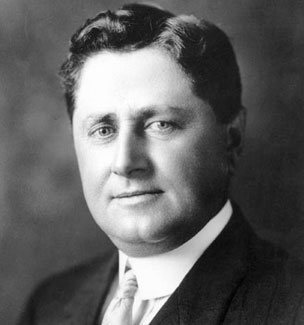
William Wrigley Jr.
Class of 2004
William was born in Philadelphia in 1862, the son of a soap manufacturer. He moved to Chicago at the age of 29 to sell soap for his father’s company. There, with just $32 in his pocket and a dream of running his own business, he used his skills as a salesman and entrepreneur and began offering baking powder along with his father’s soap.
As an incentive, William offered two free packs of chewing gum from the Zeno Manufacturing Co. with each can of baking powder. At the time, there were more than a dozen chewing gum companies in the U.S., but the industry was relatively undeveloped.
William’s idea of offering the gum as an incentive was such a success that he was able, just one year later, in 1893, to introduce his own brands – Lotta and Vassar. Soon Juicy Fruit and Wrigley’s Spearmint made their debuts and by 1911 Wrigley’s Spearmint was the leading gum in the U.S.
A gifted salesman, William built personal relationships with his customers and accommodated their needs. As the company grew, he developed a knack for inspiring enthusiasm in those who worked for him.
Struggling for a foothold in the chewing gum category, he always applied his basic business principle: “Even in a little thing like a stick of gum, quality is important.”
While his gum sold for only five cents a pack, profits were enormous, growing from $8.5 million in 1921 to $12.2 million in 1930.
William was a noted pioneer in the use of advertising to promote branded merchandise, utilizing newspapers, posters and magazines. He correctly identified that increasing brand recognition would build demand and he spent more than $100 million in advertising, which made him the largest single-product advertiser of the day.
William’s empire grew to include real estate, mining, hotels and railroads. He built the Wrigley Building in Chicago and purchased the Chicago Cubs in 1920. In 1926, Cubs Park was renamed Wrigley Field in his honor. He passed away at his home in Phoenix on January 26, 1932.